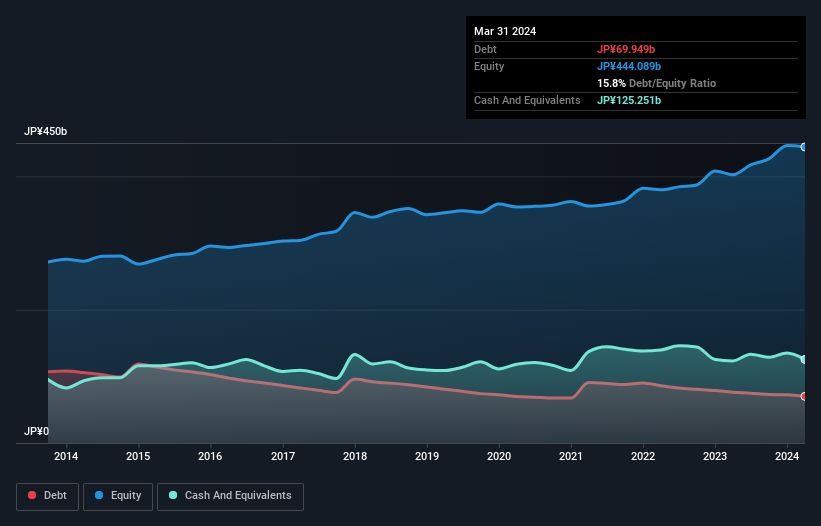
The external fund manager backed by Berkshire Hathaway's Charlie Munger, Li Lu, makes no bones about it when he says 'The biggest investment risk is not the volatility of prices, but whether you will suffer a permanent loss of capital.' When we think about how risky a company is, we always like to look at its use of debt, since debt overload can lead to ruin. We note that Yamazaki Baking Co., Ltd. (TSE:2212) does have debt on its balance sheet. But should shareholders be worried about its use of debt?
When Is Debt A Problem?
Debt assists a business until the business has trouble paying it off, either with new capital or with free cash flow. In the worst case scenario, a company can go bankrupt if it cannot pay its creditors. While that is not too common, we often do see indebted companies permanently diluting shareholders because lenders force them to raise capital at a distressed price. Having said that, the most common situation is where a company manages its debt reasonably well - and to its own advantage. The first thing to do when considering how much debt a business uses is to look at its cash and debt together.
See our latest analysis for Yamazaki Baking
What Is Yamazaki Baking's Debt?
The image below, which you can click on for greater detail, shows that Yamazaki Baking had debt of JP¥69.9b at the end of March 2024, a reduction from JP¥76.2b over a year. But on the other hand it also has JP¥125.3b in cash, leading to a JP¥55.3b net cash position.

A Look At Yamazaki Baking's Liabilities
The latest balance sheet data shows that Yamazaki Baking had liabilities of JP¥250.9b due within a year, and liabilities of JP¥95.9b falling due after that. On the other hand, it had cash of JP¥125.3b and JP¥133.2b worth of receivables due within a year. So its liabilities outweigh the sum of its cash and (near-term) receivables by JP¥88.3b.
Since publicly traded Yamazaki Baking shares are worth a total of JP¥668.9b, it seems unlikely that this level of liabilities would be a major threat. Having said that, it's clear that we should continue to monitor its balance sheet, lest it change for the worse. Despite its noteworthy liabilities, Yamazaki Baking boasts net cash, so it's fair to say it does not have a heavy debt load!
Even more impressive was the fact that Yamazaki Baking grew its EBIT by 101% over twelve months. If maintained that growth will make the debt even more manageable in the years ahead. The balance sheet is clearly the area to focus on when you are analysing debt. But it is future earnings, more than anything, that will determine Yamazaki Baking's ability to maintain a healthy balance sheet going forward. So if you want to see what the professionals think, you might find this free report on analyst profit forecasts to be interesting.
But our final consideration is also important, because a company cannot pay debt with paper profits; it needs cold hard cash. Yamazaki Baking may have net cash on the balance sheet, but it is still interesting to look at how well the business converts its earnings before interest and tax (EBIT) to free cash flow, because that will influence both its need for, and its capacity to manage debt. Over the most recent three years, Yamazaki Baking recorded free cash flow worth 70% of its EBIT, which is around normal, given free cash flow excludes interest and tax. This cold hard cash means it can reduce its debt when it wants to.
Summing Up
Although Yamazaki Baking's balance sheet isn't particularly strong, due to the total liabilities, it is clearly positive to see that it has net cash of JP¥55.3b. And it impressed us with its EBIT growth of 101% over the last year. So we don't think Yamazaki Baking's use of debt is risky. Over time, share prices tend to follow earnings per share, so if you're interested in Yamazaki Baking, you may well want to click here to check an interactive graph of its earnings per share history.
Of course, if you're the type of investor who prefers buying stocks without the burden of debt, then don't hesitate to discover our exclusive list of net cash growth stocks, today.
New: Manage All Your Stock Portfolios in One Place
We've created the ultimate portfolio companion for stock investors, and it's free.
• Connect an unlimited number of Portfolios and see your total in one currency
• Be alerted to new Warning Signs or Risks via email or mobile
• Track the Fair Value of your stocks
Have feedback on this article? Concerned about the content? Get in touch with us directly. Alternatively, email editorial-team (at) simplywallst.com.
This article by Simply Wall St is general in nature. We provide commentary based on historical data and analyst forecasts only using an unbiased methodology and our articles are not intended to be financial advice. It does not constitute a recommendation to buy or sell any stock, and does not take account of your objectives, or your financial situation. We aim to bring you long-term focused analysis driven by fundamental data. Note that our analysis may not factor in the latest price-sensitive company announcements or qualitative material. Simply Wall St has no position in any stocks mentioned.
Have feedback on this article? Concerned about the content? Get in touch with us directly. Alternatively, email editorial-team@simplywallst.com
About TSE:2212
Excellent balance sheet average dividend payer.
Similar Companies
Market Insights
Community Narratives



